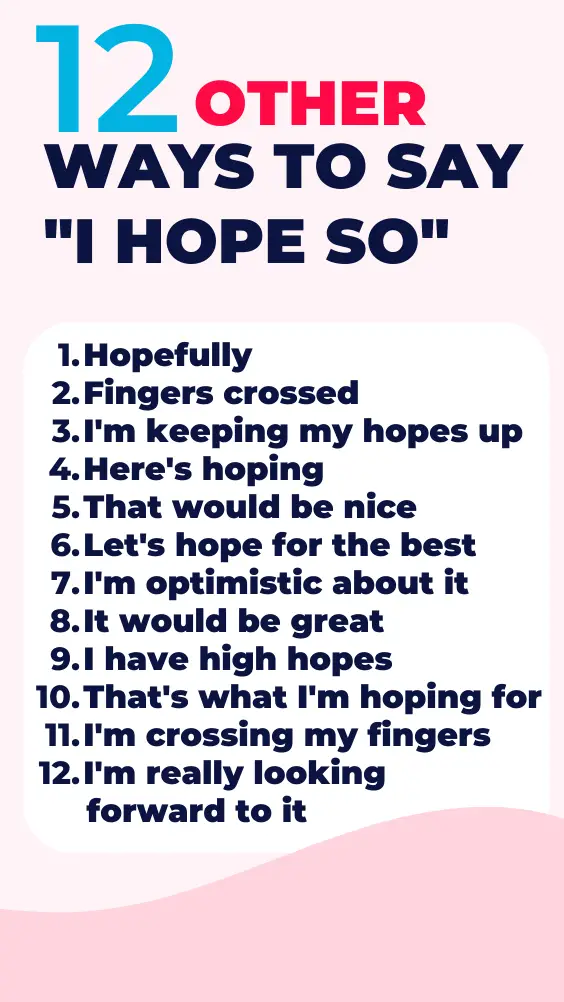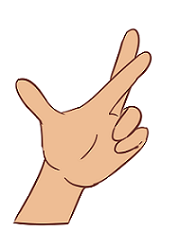It is easy to understand what the phrase “I hope” means, but we will still give you a brief explanation and explain more about it. We’ll also give you lots of good alternatives to diversify your vocabulary. Furthermore, if you’re looking for a more professional way to express some hope, you’ll find some more formal alternatives below.
What is the Meaning of “I Hope So”?
In general, “I hope so” is used when you want to express your optimism, desire, or agreement with the possibility of something happening in the future.
Should I Put “So” in the Phrase “I Hope So”?
Including “so” in the phrase “I hope so” is a matter of personal preference and style. Both “I hope” and “I hope so” are commonly used and understood phrases. However, the addition of “so” can provide a slightly stronger emphasis on the affirmation or agreement with a statement or possibility.
Using “I hope so” can be useful in situations where you want to convey a stronger sense of agreement or anticipation. For example:
John: “I think we’ll be able to finish the project on time.”
Sarah: “I hope so.”
In this context, the inclusion of “so” reinforces Sarah’s agreement and optimism regarding the timely completion of the project.
Ultimately, the choice to include “so” in the phrase depends on the specific context, your personal style, and the level of emphasis or agreement you wish to convey.
12 Other Ways to Say “I Hope So”
1. Hopefully
You might use this phrase when you are optimistic that a certain thing will happen, such as the weather will be pleasant or reaching your target this month, for example.
2. Fingers crossed
You can use this phrase when you are both optimistic and wishing yourself luck. For example, “Fingers crossed that I get the job I interviewed for.”
3. I’m keeping my hopes up
There’s a bit of uncertainty with that phrase, but you keep your positive attitude nonetheless. For example, “Even though the event may not go as planned, I’m keeping my hopes up to be successful in the end.”
4. Here’s hoping
This phrase also implies an optimistic outlook. For instance, “Here’s hoping that your presentation goes well.”
5. That would be nice
You might use this phrase when you are hoping something positive will happen, such as wishing you could finish your project early – “If we could finish the project early, that would be nice.”
6. Let’s hope for the best
You can say this phrase when, for example, you’ve already done your best and are now expecting a positive outcome – “We’ve done our best, so let’s hope for the best.”
7. I’m optimistic about it
This phrase is slightly different because here you are expressing that you are calm and that you are optimistic about the particular situation. For example, you might say “Despite the challenges, I’m optimistic about our chances of success.”
8. It would be great
Another great substitute for “I hope so”. For example, you could use it in a sentence when you’re excited that something good is going to happen, such as working together with a favorite colleague – “If we could work together, it would be great.”
9. I have high hopes
With this expression, hope is at a higher level, meaning that you are almost certain that what you expect will happen – “I have high hopes for our team’s performance in the upcoming match.”
10. That’s what I’m hoping for
Use this when expressing agreement or alignment with someone else’s desired outcome. For instance, “You want to travel next summer? That’s what I’m hoping for too!”
11. I’m crossing my fingers
This is a common colloquial expression. For example, if your friend or colleague has an important meeting coming up, you can tell them “I’m crossing my fingers that everything goes smoothly during the event.”
12. I’m really looking forward to it
You can use it when you are excited about a future moment, for example, if you have a vacation coming up you can say “I’m really looking forward to our vacation next week.”

When Should I Say “I Hope So”?
This expression is used when you want something specific to happen, but here are some examples of situations in which you might use it:
1. When someone asks if you will be able to attend an event:
“Will you be able to come to the party tomorrow?” You can respond, “I hope so.”
2. When discussing a potential outcome:
“Do you think we’ll win the game?” You can reply, “I hope so.”
3. When someone shares a plan or idea with you:
“I’m thinking of applying for that job. What do you think?” You can say, “Sounds promising. I hope so.”
4. When discussing a future arrangement or appointment:
“Can we meet for lunch next week?” Your response could be, “I hope so, let me check my schedule and confirm.”
5. When acknowledging a possibility:
“Do you think the concert will be canceled due to the weather?” You can express uncertainty by saying, “I’m not sure, but I hope so.”
Is It Professional to Say “I Hope So”
The phrase “I hope so” is conversational rather than formal. If you need to use the phrase in a more formal communication you can use one of its alternatives. But if, for example, you are talking to a close colleague or friend there is no problem saying “I hope so” as many times as you like.
More Professional Ways to Say “I Hope So”:
1. “I’m cautiously optimistic.”
2. “I have a positive outlook on that possibility.”
3. “I’m keeping a positive mindset regarding that outcome.”
4. “I anticipate that will be the case.”
5. “I have faith in the likelihood of that happening.”
6. “Based on the information available, I’m inclined to expect a positive result.”
7. “I’m confident that things will work out as desired.”
8. “It appears to be a promising prospect.”
9. “I’m looking forward to a favorable outcome.”
10. “It is my expectation that it will turn out positively.”









